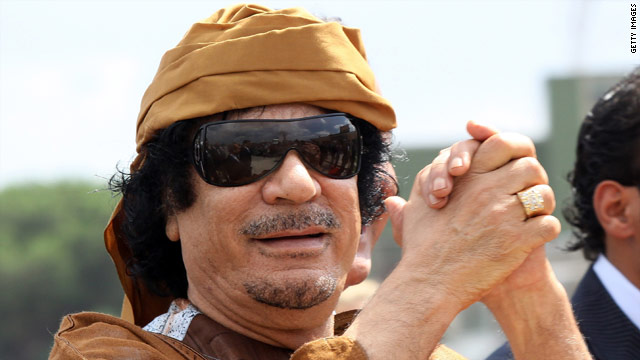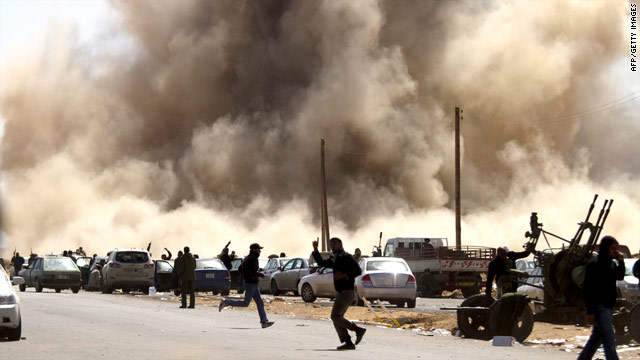March 8, 2011 6:47 p.m. EST

Rebels: Gadhafi wants a deal
STORY HIGHLIGHTS
- NEW: Obama and Cameron discuss Libya
- The U.S. State Department says departure would not exempt Gadhafi
- Deadly fighting occurs in Zawiya, a doctor says
- The World Food Programme gets tons of food into Libya
Speaking to reporters, members of the Libyan National Transitional Council said there have been no such talks. Council spokesman Abdel Hafez Ghoga also denied reports that the opposition would promise not to pursue Gadhafi for crimes if he steps down within three days.
Earlier, a member of an opposition group called the February 17 Coalition said Gadhafi was trying to strike a deal with opposition leaders, saying he would step down as Libya's leader if they would guarantee him safe passage out of the country and promise that neither he nor his family would face prosecution.
The coalition member, Amal Bugaigis, said the opposition submitted counteroffers, which included a stipulation that Gadhafi had to immediately concede he is not the ruler of Libya.
Inside the mind of Saif Gadhafi
Gadhafi was expected to meet Tuesday with reporters at a hotel in Tripoli. The transistional council's 31 members represent most areas of Libya and focus on organizing a governmental structure for a post-Gadhafi Libya.The Libyan opposition is composed not of a single monolithic group, but of various groups and individuals around the country whose shared goal is to see the 68-year-old ruler ousted.
Gadhafi's regime, meanwhile, also denied having entered into negotiations with the rebels. Musa Ibrahim, a government spokesman, called reports of such negotiations "lies."
In Washington, U.S. State Department spokesman P.J. Crowley said any departure from Libya of Gadhafi would not exempt him, his family or others from responsibility for their actions. "We are going to hold him accountable," Crowley said.
U.S. President Barack Obama discussed Libya on Tuesday with British Prime Minister David Cameron, the White House said in a statement.
"They agreed that the common objective in Libya must be an immediate end to brutality and violence; the departure of Gadhafi from power as quickly as possible; and a transition that meets the Libyan peoples' aspirations for freedom, dignity, and a representative government," it said.
Both leaders agreed to go ahead with planning responses, "including surveillance, humanitarian assistance, enforcement of the arms embargo, and a no-fly zone."
The unrest in Libya, which has spiraled into a civil war, entered its fourth week Tuesday.
Fighting continued in Zawiya, despite government assertions that its forces controlled the city, a doctor told CNN after leaving the city in the morning. Two fellow doctors were fatally shot in the main square by pro-Gadhafi forces, the doctor said. Wounded civilians were being shot by members of the military, the doctor added.
Military casualties were being taken out of the city by ambulance, he said.
RELATED TOPICS
Opposition officials accused Gadhafi of bombing water reserves in Ras Lanuf, the site of intense fighting in recent days.
Rebels have seized several cities and the army has fought fiercely to reclaim some of them.
Death toll estimates have ranged from more than 1,000 to as many as 2,000.
"Both the Libyan government and opposition forces need to allow unhindered access for aid organizations to assist civilians," Bill Frelick, refugee program director at Human Rights Watch, said Tuesday. "People living in areas of heavy fighting in western Libya are now in dire need of medical aid and other assistance."
The U.N. World Food Programme said Tuesday a convoy of trucks entered Libya headed for Benghazi, the rebel stronghold in eastern Libya. "A convoy of trucks carrying 70 metric tons of high-energy, fortified date bars crossed the Egyptian border last night on its way to Benghazi. This would be the first delivery of food assistance from a U.N. agency to enter the country," the organization said in a statement.
Plans for more food deliveries are being made, and tons of food have been delivered to the Egyptian border to help feed refugees, the organization said.
This is part of a $39.2 million emergency operation designed to help feed more than one million people in Libya, Egypt and Tunisia over three months, the group said.
Late Monday, the Gulf Cooperation Council said Libya had rejected its offer of humanitarian aid. The council is composed of Bahrain, Kuwait, Oman, Qatar, Saudi Arabia and the United Arab Emirates.
As reports continue to emerge of the government's use of force against civilians, the international community has been left pondering strategies on how to end the violence.
Three members of the U.N. Security Council -- France, Britain and the United States -- were working Monday on a possible resolution that would include language on a no-fly zone over Libya, diplomatic sources at the United Nations said. And the Gulf Cooperation Council said Monday night they supported such an action.
The Organization of the Islamic Conference, which represents 56 member states, said Tuesday that it wants the United Nations to enforce a no-fly zone over Libya.
But any kind of military intervention could face sharp criticism from Russia and China, two permanent members of the council that wield veto power.
The U.S. ambassador to Libya, Gene Cretz, has met in Rome, Italy, and Cairo, Egypt, with Libyan opposition figures to get a sense of what is happening in the country, Crowley of the State Department said. He did not give names. Crowley said there have been meetings and phone conversations with members of the National Transitional Council and others.
The State Department also spoke Friday with Libyan Foreign Minister Musa Kusa in a brief conversation in which each side gave its view, Crowley said.
NATO said it has begun round-the-clock surveillance flights near Libya.
With no clear end to the clashes in sight, U.N. Secretary-General Ban Ki-moon appointed a new special envoy to Libya to discuss the crisis with officials in Tripoli.
The fighting has sparked the flight of Libyans and foreigners out of Libya, with nations across the globe scrambling to help people leave.
About 200,000 people have fled Libya with nearly equal numbers going to Tunisia and Egypt, the U.N. refugee agency has said.
But 15,000 to 17,000 people are still at a refugee camp near the Libya-Tunisia border. Most of them are from Bangladesh, the U.N. refugee agency said.
A man who said he was trapped in Misrata, a city east of Tripoli that has seen heavy clashes, said the rebels were running out of weapons -- but will continue to fight.
"Maybe tomorrow I'll still be alive, I don't know. I have nothing to lose," the man said. "Nobody believes he will be alive tomorrow. Nobody knows. We need support."


No comments:
Post a Comment